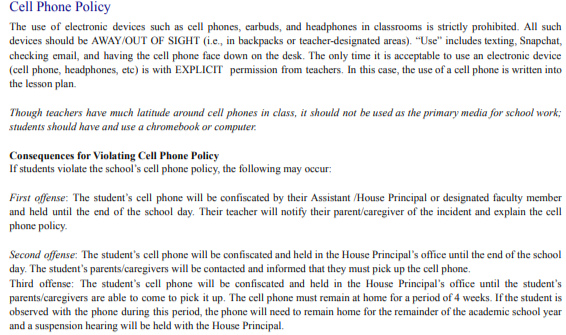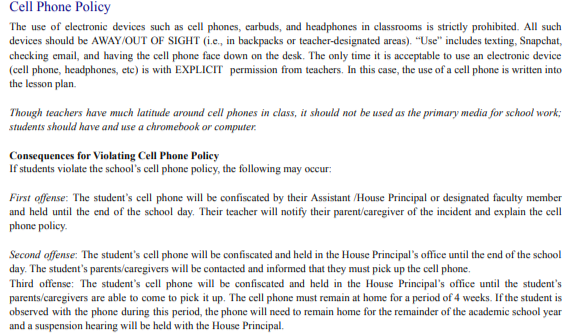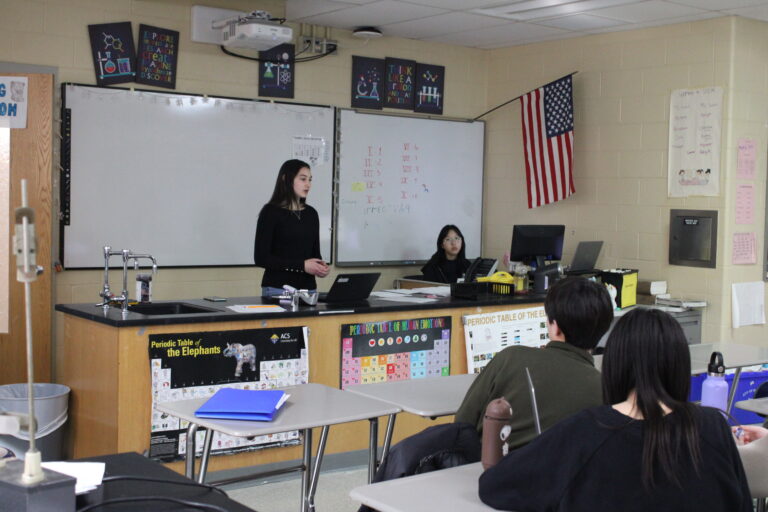
Divina Wembi
This new year in Malden High School has sparked a lot of new changes for the returning upper classes. As they walk through the doors, they do not know what this school year had in store for them. Things such as the infamous new phone policy, which left most feeling conflicted.
The phone policy works as a way to prevent students from using their phones and other distracting devices during class time. The implementation of the phone policy was made in hopes of promoting consistently engaged students whilst stimulating their minds.

Though this policy could be used for better or worse during the remainder of the school year, many students, as well as faculty, have very divergent opinions on this matter.
Leisha Fortunat, a senior in Malden High School, is stuck between both sides when asked her opinion on how the student phone policy can benefit students who abide by them. She goes on to explain how strict screen time gives students the chance to live up to their fullest potential as a learner and as a contributor in the class. With the removal of distractions, it enhances the student’s focus. “The attention will totally be on the teacher,” states Fortunat. However, she mostly agrees with the fact that the phone policy shouldn’t be included in the curriculum. It is entirely too restrictive, and “feels like an ongoing punishment”.
Clarah Ambroise, a 12th-grade senior in Malden High, also sides with her fellow peer Fortunat. She also understands why teachers would possibly favor the phone policy since it would allow them to teach the class in a more “proficient way”. In addition, she displays to us a different perspective by stating that “the students are too focused on finding ways to sneak their phones”, meaning that students distract themselves even further by coming up with different solutions to use their phones during class time rather than accepting their fate and following the guidelines of the school rule.
The Student Phone policy so far has been utilized to terminate distractions. Its main goal is to encourage focus and productivity. Taryn Belowsky strongly agrees with this perspective. Phones for so long have been the backbone of our society, but even something as innovative as this has side effects. Though they are extremely helpful, phones carry the capability to generate distractions, especially in younger generations. In this case, students have found it difficult to focus, while teachers have trouble controlling their classes. “…and I think it’s really hard for teachers to monitor and make sure that the students in front of them are focused on understanding the curriculum. And if cell phones are a distraction, that makes it 10 times harder. So I do think it’s helpful for students and for staff in regards to focus.”, stated Belowsky.
Belowsky believes the reason why phone addictions have skyrocketed among teens is because they have become heavily dependent on them during quarantine. In the course of that time, teens had no choice but to rely on phones to connect to the outside world. This certain lifestyle has created an addiction within them, and much like other dependencies, it is extremely difficult to let go. “I think it’s about having the correct limits when you’re using different technology,” she said. This is where the Student Phone Policy comes into action, by reinforcing a strict time frame for phones within a learning environment. Belowsky also explains how the phone policy has been in the works since 2021-2022. Based on that time period, administrators have created the phone policy with the expectations that it would impact students greatly and she agrees in that aspect it’s done a great job.




